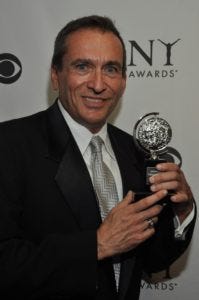FROM 'WICKED' TO 'DEAR EVAN HANSEN': THE LESSONS OF PRODUCER-INVESTOR CARL MOELLENBERG

INTERVIEW: Is the moderately successful commercial Broadway production in danger of extinction?
"There are still many shows doing exceptionally well, but it seems there are more shows falling off the vine really quickly," said Carl Moellenberg, who's had 40 Broadway producing credits since 2006. "If people are only seeing two or three shows a year, they want to see the shows everyone is talking about."
Moellenberg has given a lot of thought to what gets people talking and is worthy of investment. Sitting at the dining room table at his Chelsea apartment, near a glass case with his seven Tony Awards, he said he seeks material that makes an emotional impact. He wants tight financials that provide for high-quality production values but still give backers a fighting chance to make money. The creative and production teams should be talented and communicative. A revival must have a compelling concept, a raison d'être.
And as much as Moellenberg loves a great ensemble, he'll make an exception to his criteria for the right star. "When you have a Nathan Lane or Al Pacino or Hugh Jackman, they’re major stars people want to see," he said. "They decrease the risk exponentially."
We sat down with the classically trained pianist, who worked in financial services for two decades before turning to theater investing and producing, to pick his brain about Broadway's confusing crosscurrents. Although grosses rise every year, just three musicals fully repaid their investors from the past two seasons -- Fun Home, Hamilton and Waitress. Last week, Hamilton alone accounted for 16 percent of Broadway's grosses. "People are becoming more much cognizant of what is a hot ticket and they want to see it."
He showed us a list of 71 shows on Broadway, on tour, in London and in Australia that he co-produced or invested in since 2003. According to him, 62 percent made money. For verification, the accountant Phil Ambrosino wrote in an email that to the best of his knowledge, the information is accurate. Just under half of the Broadway shows Moellenberg produced have recouped. He's made money on all the tours he co-produced or invested in and five out of seven of the West End shows. He has yet to call the shots as a lead producer, but he's developing three shows.
This season, Moellenberg is among the roughly three-dozen co-producers on Dear Evan Hansen, which is building fast at the box office after rave reviews. He said audiences identify with the anxious teenage protagonist played by Ben Platt, who has trouble being heard and sings that he's "waving through the window." "The notion of being an outsider and trying to be liked and understood is what’s resonating," he said. "It had two tryouts [at Arena Stage in Washington and at Second Stage], which was helpful to the show and they still kept the budget below $10 million." The tuneful score by Justin Paul and Benj Pasek is also a big draw, he said, and the production benefited from its aggressive and adept use of social media.
Ironically, his first theater investment was his best. In 2003, based on a hunch and the advice of one of its lead producers, he and a friend split a $35,000 stake in Wicked. "Talk about being spoiled," he said. His only regret is that he didn't commit more. He said he invests $10,000 to $175,000 of his own money in every show he's involved with.
He frets that it's become more difficult to make a buck on plays. As costs rise, producers increase star casting to stand out, which perpetuates the cost increase. And when Broadway is overrun with stars, their impact is diluted. On the demand side, tourists favor musicals. "Looking over the past few years, I am questioning whether the audience may be shrinking for plays."
Despite the formidable challenges overall, Moellenberg insists that angels with a disciplined approach can earn predictable returns over the long term. "A lot of people think that Broadway is a disastrous investment," he said. "And I don’t think it needs to be."


